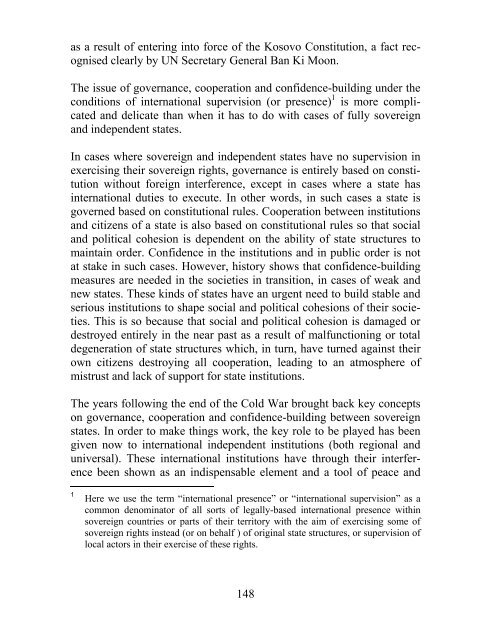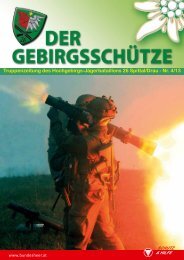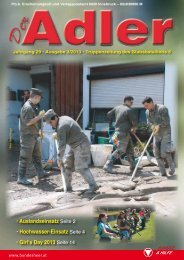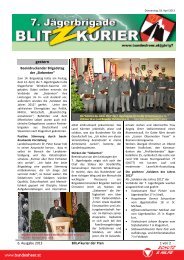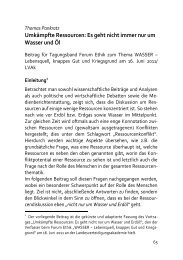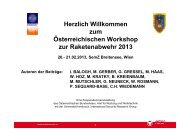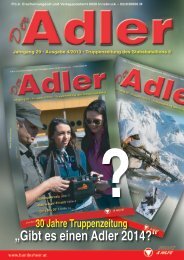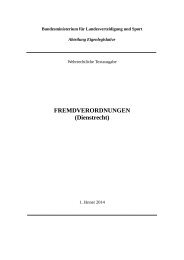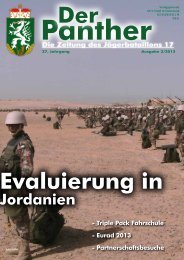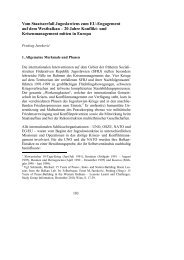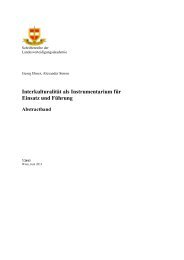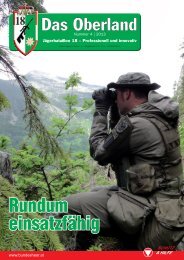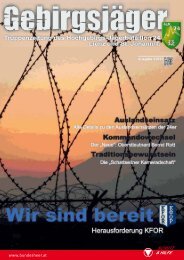Cutting or Tightening the Gordian Knot
Cutting or Tightening the Gordian Knot
Cutting or Tightening the Gordian Knot
Create successful ePaper yourself
Turn your PDF publications into a flip-book with our unique Google optimized e-Paper software.
as a result of entering into f<strong>or</strong>ce of <strong>the</strong> Kosovo Constitution, a fact recognised<br />
clearly by UN Secretary General Ban Ki Moon.<br />
The issue of governance, cooperation and confidence-building under <strong>the</strong><br />
conditions of international supervision (<strong>or</strong> presence) 1 is m<strong>or</strong>e complicated<br />
and delicate than when it has to do with cases of fully sovereign<br />
and independent states.<br />
In cases where sovereign and independent states have no supervision in<br />
exercising <strong>the</strong>ir sovereign rights, governance is entirely based on constitution<br />
without f<strong>or</strong>eign interference, except in cases where a state has<br />
international duties to execute. In o<strong>the</strong>r w<strong>or</strong>ds, in such cases a state is<br />
governed based on constitutional rules. Cooperation between institutions<br />
and citizens of a state is also based on constitutional rules so that social<br />
and political cohesion is dependent on <strong>the</strong> ability of state structures to<br />
maintain <strong>or</strong>der. Confidence in <strong>the</strong> institutions and in public <strong>or</strong>der is not<br />
at stake in such cases. However, hist<strong>or</strong>y shows that confidence-building<br />
measures are needed in <strong>the</strong> societies in transition, in cases of weak and<br />
new states. These kinds of states have an urgent need to build stable and<br />
serious institutions to shape social and political cohesions of <strong>the</strong>ir societies.<br />
This is so because that social and political cohesion is damaged <strong>or</strong><br />
destroyed entirely in <strong>the</strong> near past as a result of malfunctioning <strong>or</strong> total<br />
degeneration of state structures which, in turn, have turned against <strong>the</strong>ir<br />
own citizens destroying all cooperation, leading to an atmosphere of<br />
mistrust and lack of supp<strong>or</strong>t f<strong>or</strong> state institutions.<br />
The years following <strong>the</strong> end of <strong>the</strong> Cold War brought back key concepts<br />
on governance, cooperation and confidence-building between sovereign<br />
states. In <strong>or</strong>der to make things w<strong>or</strong>k, <strong>the</strong> key role to be played has been<br />
given now to international independent institutions (both regional and<br />
universal). These international institutions have through <strong>the</strong>ir interference<br />
been shown as an indispensable element and a tool of peace and<br />
1 Here we use <strong>the</strong> term “international presence” <strong>or</strong> “international supervision” as a<br />
common denominat<strong>or</strong> of all s<strong>or</strong>ts of legally-based international presence within<br />
sovereign countries <strong>or</strong> parts of <strong>the</strong>ir territ<strong>or</strong>y with <strong>the</strong> aim of exercising some of<br />
sovereign rights instead (<strong>or</strong> on behalf ) of <strong>or</strong>iginal state structures, <strong>or</strong> supervision of<br />
local act<strong>or</strong>s in <strong>the</strong>ir exercise of <strong>the</strong>se rights.<br />
148


